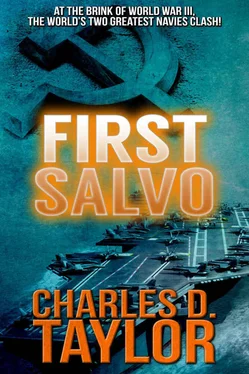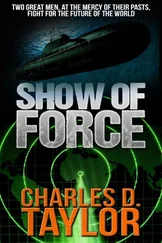After another pass over the tundra, the helo skipped up over the peak and disappeared from Ryng’s view.
He waited, somehow sensing they had been disturbed by the change in the ground cover. If he had been in the cockpit, Ryng would have known that they were concerned, that they had seen the torn bog, and that they would report it when they got back to base. But having been on Svalbard for less than a week, the two men in the helo temporarily dismissed the situation — probably a bear. They knew there were bears on the island, but they had no idea that they remained on the other end, preferring the perpetual snow cover or ocean to the barren rock and human population to the south. But when they reported the tracks later, the base commander would know that no bear would have been in that spot, and he would be in the next helo.
Back at Longyearbyen Airport, smoke still drifted from the wreckage of the Soviet bombers. Colonel Mikhail Bulgan removed his black beret, unconsciously wiping his forehead as if he were perspiring before he replaced it. He was deep in thought, studying the cartographic map that his own intelligence staff had provided the day they had been airlifted from their Pechenga base to Spitzbergen. Alongside the chart, staring back at him, was a photograph of Bernie Ryng. It was no more than a mug shot, the same type that appears on passports. This one was an I.D. photo from Pentagon files.
There was no doubt in the GRU’s mind that Ryng was the leader of the SEAL team. The exact time he had left the U.S., and how he had gotten to the remote island, were still items they hadn’t determined. But that information wasn’t necessary. That they knew who he was and how he operated was all that Bulgan cared about. The colonel would have given almost anything to have such a man on his side, and he hesitated momentarily at the idea of killing such a talent. On the other hand, men like Ryng were not the kind to change allegiance or to allow capture. Exterminating Ryng was Bulgan’s duty to himself and the Motherland. Though he had no idea of the efficacy of the decoy plan, he knew that Ryng had succeeded where he, Bulgan, had failed. Getting Ryng would be his last act as a Soviet officer — and it would be an act of satisfying revenge.
So it was a matter of finding and doing away with the man. Bulgan knew Ryng would have done the same to him. A large red cross marked their last contact with him — thrashing in the water just off the glacial stream entering the harbor. A few miles past that, the shoreline turned into sheer cliffs. There was no man, especially one on the run and without the necessary resources, who would attempt those.
Bulgan knew what he would do — and he considered himself almost the equal of Ryng. The file indicated that Ryng was no mountain climber. But he was an escape artist if ever there was one. American training included traveling long distances without sustenance, yet Bulgan knew Ryng could find something if it was available. Obviously the man was unarmed, or at least should have been after being thrown from his raft. It was likely that Ryng escaped with only his wits. But the GRU emphasized that unless the man was wounded, he still had an advantage over most other men.
The colonel traced a path on the map with his finger — up a streambed, then left into the hidden valleys that rose in an easy progression toward the final range before the Greenland Sea. Once on the opposite side, the down side, Bulgan knew that Ryng might very well have protection.
Colonel Bulgan was a hard-looking man. In an American uniform he would have resembled a U.S. Marine with his close-cropped hair, square jaw, and well-muscled, fit body. In many ways, he thought like a Marine, and that was to his advantage in this case.
The thrum of the rotors outside interrupted his thoughts, and Bulgan rose to greet the returning helo. As he watched the craft settle outside his command post, he knew immediately by the still-loaded weapons that they had found no sign of Ryng. Damn! Not only had the man succeeded admirably in his mission, he had ruined Bulgan’s.
Inside, the two men showed Bulgan where they had been, carefully transferring their rough marks onto his larger chart. They studied the recon photos closely, comparing chart terrain to satellite view. Colonel Bulgan could see how inexperienced men could have been fooled by Ryng, even with the limited hiding spots. But he also knew that his assumption about Ryng’s path was probably 90 percent correct. It was going to take a man with similar training and temperament to ferret out this American.
Bulgan used his dividers to cover the projected course to the peak, then marked off the distance on the chart. He guessed roughly how much distance Ryng could travel each hour, marking in current time where he thought the man would be. Once he checked, then rechecked the assumed track, he again closed his eyes, unconsciously removing the black beret and running his hands through his hair. In his mind’s eye, he determined where he would like to trap the American. When he was sure, he marked that general area with a red pencil and again checked off the distance.
In about six hours, give or take half an hour, Ryng should be beginning the climb on that last peak through the snowfields. There were no places to hide there. It had to be an open climb, some of the time working sideways to avoid perpendicular cliff faces. Bulgan yawned and stretched, then gave orders to his aide to awaken him in four and a half hours. He wanted a helo ready then. If Bulgan had realized that the ship with the remaining decoys had blown up outside the harbor and that there was no chance at all to resurrect the Longyearbyen mission, he never would have allowed himself the final luxury of a nap.
ABOARD A HYDROFOIL ON THE BLACK SEA
The run across the Black Sea to the Bosporus entrance to the Turkish straits would take about eight hours — and 90 percent of their fuel supply. The last three hours would be in daylight and more dangerous. Lassiter explained to Henry Cobb that the only advantage they had was that they were riding a Russian boat in a Russian sea under Russian air cover. Once they approached the Turkish coast, a Soviet boat would be in unfriendly waters. War, though not yet declared, was a foregone conclusion as far as the Turks were concerned.
The last message to Lassiter explained that the Turkish government had been advised that their boat would be approaching Turkish waters early that morning and that it would be refueling at Istanbul. Somehow, Lassiter explained, he doubted that every single gunner in the Turkish military had been informed that a Soviet hydrofoil flying an American flag was to be allowed to pass without a second look. It just didn’t make sense, considering all that Turkey had been through over the past few days and considering that much of the trouble had been due to the Russians’ interference.
During the night passage, Soviet aircraft would swoop down to missile range, breaking off each time Lassiter’s electronic identification system would provide a friendly response. Turkish aircraft did not yet have the luxury of closing in on them. Though there was no declared war, the Soviets would chase the Turks back whenever they approached Russian airspace.
First light brought with it the sight of land, a low, hazy line to westward. The only one at all rested was Keradin. Since Lassiter spent almost all of his time in the wheelhouse, it was up to Cobb and Verra to keep watch over the Russian. When a turn came to rest, sleep was almost impossible. Lassiter insisted on the fastest speed consistent with arriving in one piece. He was unconcerned if the boat disintegrated thirty seconds after they finished with it, so they were able to maintain about forty knots an hour. The constant vibration, the roll of the boat from side to side as it slid down the swells, the bouncing to bring it back on course, each made sleep a wish rather than a reality. Cobb was used to going for two, even three days without much sleep but this was a test of his endurance. Even with an earlier nap, the hot day in the vineyards had done nothing to improve his strength.
Читать дальше












